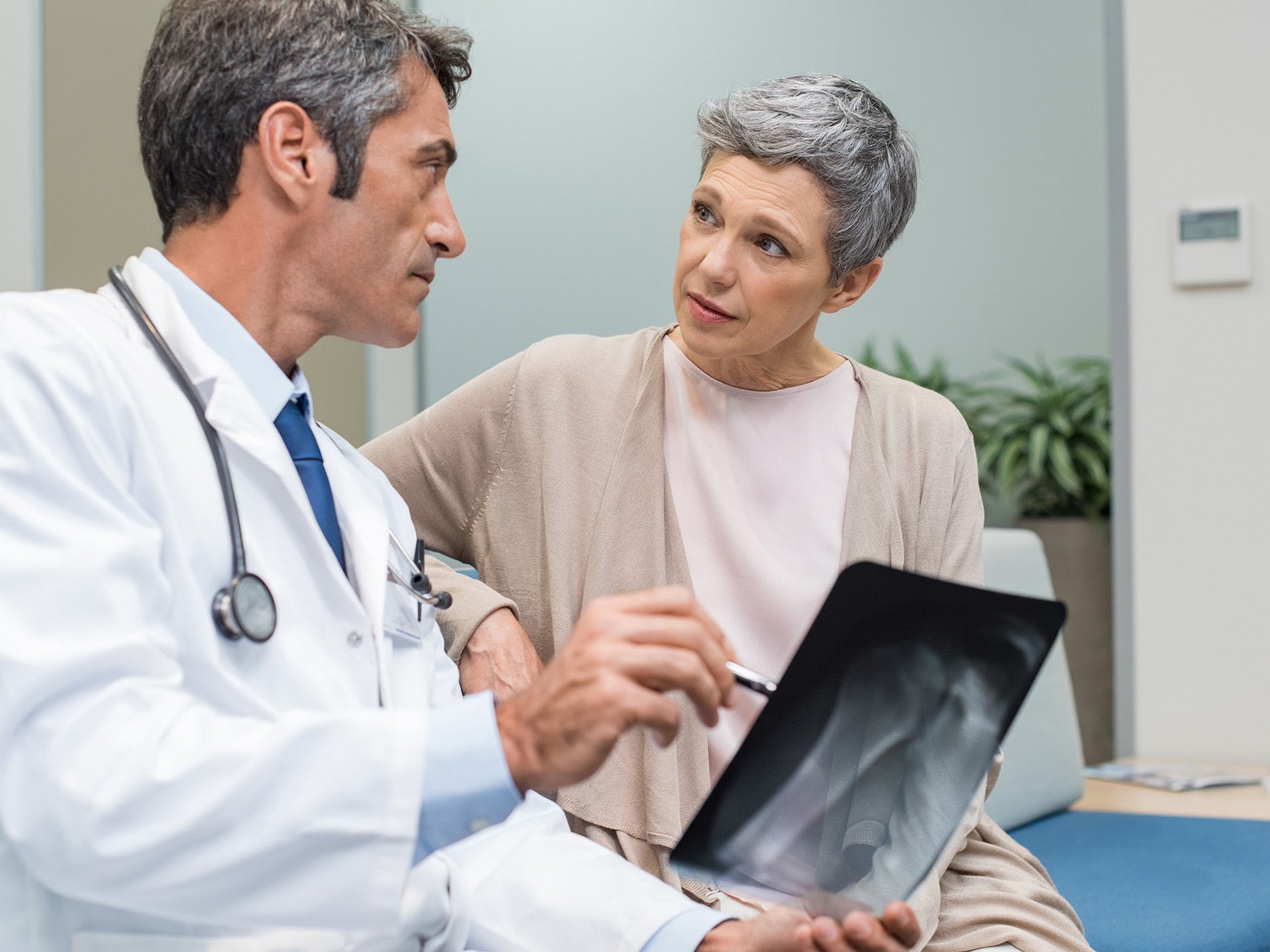Osteoporosis Resources

For patients managing it, living with it or simply looking to avoid it.
Studies show that about one in two women and up to one in four men over 50 will break a bone due to osteoporosis. But fortunately, there’s plenty you can do to keep your bones strong before, during and after an osteoporosis diagnosis. Of course, treatment is often still required, and we have a program dedicated to personalized osteoporosis care.
Taking Charge of Your Bone Health
While effective treatment is critical to maintaining or restoring bone health, there are lifestyle changes you can make that can help immensely.
Diet
Calcium and vitamin D are essential in helping maintain bone density and formation, but protein and caloric energy are also important to a bone-healthy diet. See below to learn about how changes in your diet can help prevent or control osteoporosis.
Alcohol
In moderation, alcohol is fine, but more than two drinks a day can increase your risk of fracture.
Exercise
Staying physically active is excellent for all aspects of your health, including your bones. Exercise may decrease fracture risk by improving bone mass, strengthening muscles and improving balance — which can make you less likely to have a fall and injure yourself.
Most experts recommend 30 minutes of exercise, three times per week. Talk with a trainer or your provider about the best exercises for you. But make sure you stick with it, because the benefits are quickly lost once you stop.
Quit smoking
Among the other well-known negative health effects, tobacco use is also known to speed bone loss. In fact, studies have suggested that by the time they reach menopause, women who smoke one pack a day will have a 5% to 10% reduction in bone loss. This means more chances for a fracture.
Avoid falls
Compared with other behavior changes, falls are accidental, and you can’t make yourself simply not fall. But there are things you can do to improve your environment and make yourself less prone to falls.
- Remove loose rugs, electrical cords and other tripping hazards
- Make sure there is adequate lighting throughout your home, including in stairwells and entryways.
- Avoid slippery surfaces like icy sidewalks and wet or freshly polished floors.
- Avoid walking in generally unfamiliar areas.
- Talk to your provider about medications you’re taking — if any are likely to cause dizziness, drowsiness or other side effects that can increase fall risk, ask them to replace with ones that are less likely to do so.
- Regularly have your vision checked and make sure to always use your corrective lenses.
Monitor your medications
Certain drugs can increase potential for bone loss, and either lowering your dosage or switching to another medication can reduce your risk of osteoporosis. Check with your provider so that all aspects of your care can be considered. Medications that may increase bone loss include:
- Glucocorticoid medications (like prednisone)
- Heparin, an anticoagulant
- Certain anti-seizure medications (like phenytoin, carbamazepine, primidone and phenobarbital)
- Aromatase inhibitors for breast cancer (like letrozole and anastrozole)
Source: ©2022 UpToDate, Inc.
Eating for Your Bones
A variety of nutrients are vital to healthy bodily functions and strong bones, but calcium and vitamin D are the most important in preventing osteoporosis. Fortunately, they’re easy to incorporate into your diet.
Calcium recommendations
For men and premenopausal women: At least 1,000 mg per day.
For postmenopausal women: 1,200 mg per day.
Avoid over 2,000 mg per day, due to possibility of side effects.
Calcium-rich foods
Mainly milk and other dairy products, green vegetables such as kale and broccoli, certain fish like salmon, legumes like soybeans, and orange juice fortified with calcium.
You may also find it necessary to take calcium supplements if you can’t get your daily requirement from your diet alone. Your provider can help you choose one that’s right for you.
Vitamin D recommendations
Vitamin D is crucial to bone health because it helps the body absorb calcium. For men over 70 and postmenopausal women, 800 international units per day can reduce bone loss and fracture rate among patients who have an adequate calcium intake.
For premenopausal women or for younger men with osteoporosis, 600 international units of vitamin D is recommended.
Vitamin D-rich foods
Some foods are naturally rich in vitamin D, like egg yolks, saltwater fish and liver. Others are fortified, which means they have had it and other nutrients added to make the food more nutritious. These include milk, orange juice, yogurt and breakfast cereal.
Most people do not get enough vitamin D alone. They should talk with their provider for help choosing a supplement that can help.
